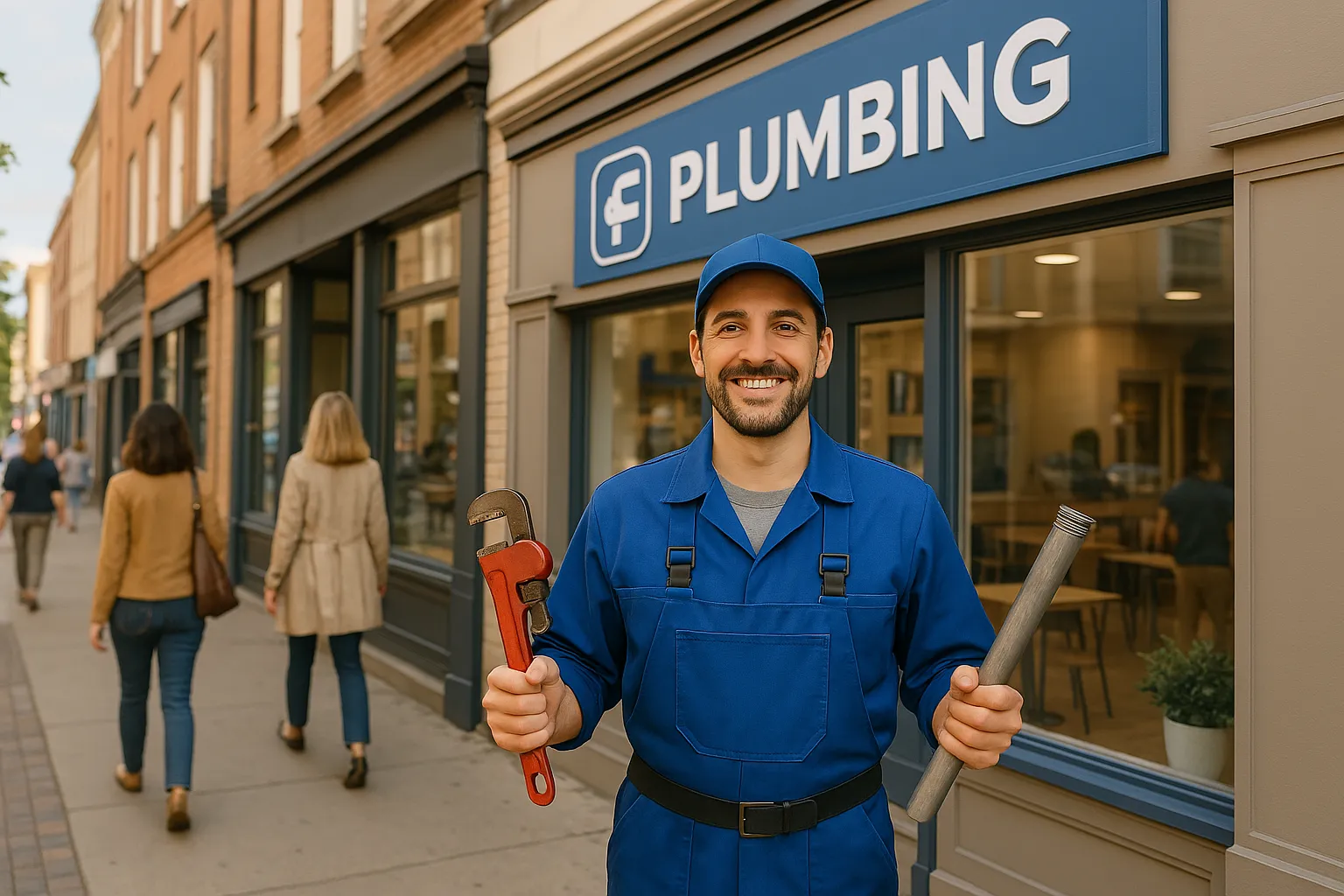Is It Worth Starting a Plumbing Business? A Complete Guide for Aspiring Plumbers
Starting your own plumbing business can absolutely be worth it – the demand for plumbers is steady and the earning potential is high.
However, success isn’t guaranteed. It requires hard work, proper licensing, and smart business planning to turn those leaky pipes into solid profits. In this guide, we’ll break down the pros, cons, startup costs, and tips so you can decide if taking the plunge into a plumbing business is the right move for you.

Why Many Plumbers Consider Starting Their Own Business
The plumbing industry has strong and growing demand, making it an appealing field for entrepreneurship. Here are a few reasons starting a plumbing business can be worthwhile:
Steady Need for Plumbers: Pipes leak, drains clog, and water heaters fail regardless of the economy. Plumbing services are essential in every community, ensuring a constant baseline demand. In fact, the U.S. plumbing industry is valued at over $158 billion and includes more than 130,000 businesses employing 736,000+ people (IBISWorld). The job market is projected to grow ~6% by 2033 (BLS).
High Income Potential: As a business owner, you keep the profits from jobs you complete, rather than earning an hourly wage for someone else. While the median salary for an employed plumber in the U.S. is about $61,500/year(BLS), business owners can earn significantly more. It’s not uncommon for successful plumbing business owners to make well into six figures annually. (One UK plumber reportedly earned £210,000 in a year by running his own business!)(Metro UK)
Be Your Own Boss: Owning a plumbing business means total control over your work. You can choose your clients, set your rates, and decide your schedule. Want to take a long weekend or only work certain neighborhoods? As the boss, that’s up to you. This independence and flexibility attract many plumbers to go solo.
Personal Satisfaction: There’s a real pride in building something of your own. Many plumbers find it rewarding to solve customers’ urgent problems and see direct results in positive reviews and repeat business. You’re not just fixing pipes – you’re building a reputation and a company. That sense of accomplishment can make all the hard work feel worth it.
Room to Grow: A small one-truck plumbing operation can expand over time. There’s potential to hire a team, take on bigger projects, or even open additional locations. In other words, today’s one-person shop can become tomorrow’s thriving company if you reinvest and scale smartly. Being the owner positions you to reap the rewards of that growth.
Overall, the market outlook is favorable. The industry is resilient and lucrative in the U.S. and abroad (for example, the UK plumbing market was worth £16.45 billion in 2022 with 4.3% annual growth). If you have the plumbing skills and the drive to run a business, there are plenty of reasons it can be worth it to start a plumbing company.
Weighing the Pros and Cons of Starting a Plumbing Business
Before you quit your job and order business cards, it’s important to balance the excitement with realism. Owning any business has downsides to go with the upsides. Let’s break down the key pros and cons:
Pros: What Makes a Plumbing Business Worthwhile?
✅ High and Consistent Demand: As noted, plumbing problems aren’t going away. You’ll tap into a broad customer base that needs your services year-round, from emergency repairs to new installations.
✅ Control Over Income: Instead of being stuck with an hourly wage or salary, you can set your own prices and take on as much work as you can handle. With strong effort and smart marketing, your earnings have no cap. Many plumbing businesses easily gross six figures, and owners get to take home the profits after expenses.
✅ Independence: You’re in charge of all business decisions – from choosing clients to scheduling and business strategy. This autonomy is liberating if you prefer to do things your own way. You can also pick and choose jobs (e.g. focusing on profitable emergency calls or specific plumbing niches you enjoy) rather than taking whatever your boss assigns.
✅ Flexible Schedule: While you’ll likely work long hours (especially at first), you do have flexibility. Need to attend a family event or take a vacation? You can arrange your business calendar accordingly. Many owners appreciate being able to prioritize personal commitments when needed.
✅ Room for Creativity and Growth: Solving unique plumbing issues requires creativity and skill. As an owner, you can also get creative with business growth – for instance, offering new services (drain cleaning, HVAC, remodeling) or expanding into new areas. There’s satisfaction in innovating and seeing your business evolve.
✅ Building Equity: Over time, you’re not just earning a paycheck – you’re building an asset. A well-run plumbing business gains value. Down the road, you could sell the business or pass it on, which is a wealth-building opportunity employment can’t provide.
Cons: Challenges and Downsides to Be Aware Of
❌ High Startup Costs: Getting started isn’t cheap. You’ll need a reliable work vehicle (often a van or truck), a full set of tools and equipment, insurance, licenses, and initial marketing. These upfront costs can easily reach into tens of thousands of dollars. (Some estimates put the minimum around $10,000 if you already own a vehicle and tools.) Lack of capital can be a barrier.
❌ Long Hours & Physical Demands: In the beginning, expect to wear many hats and work some very long days. You’ll be doing service calls, handling billing, taking customer phone calls at all hours, and more. Plumbing is also physically tough – lots of bending, lifting, and sometimes messy or dangerous tasks. Burnout and fatigue are real risks.
❌ Income Can Be Uncertain: Especially early on, workloads can fluctuate. One week you’re booked solid; the next, the phone is quiet. This makes income unpredictable. You have to budget carefully and build up an emergency fund to get through slow periods. Over time, referrals and repeat clients will smooth this out, but it’s a hurdle initially.
❌ Business Responsibilities: Being great at plumbing isn’t enough – you also have to run a business (bookkeeping, taxes, marketing, customer service, etc.). Many new owners find it challenging to juggle everything. Mistakes in pricing, scheduling, or paperwork can hurt your reputation or finances. It takes time to learn the business side, and not everyone enjoys it.
❌ Competitive Markets: In many areas, you’ll be up against established plumbing companies with big budgets for advertising. Breaking in can be tough. You’ll need to find a way to stand out (such as specializing in a niche or offering superior service) to win customers from competitors. Building a client base takes hustle and effective marketing.
❌ 24/7 Emergencies: Plumbing emergencies don’t follow a 9-to-5 schedule. As a new business owner, you’ll likely be on-call at all hours to build your reputation. Late-night or weekend emergency calls can disrupt your personal life. Until you can hire help or set boundaries, the business can feel like a 24/7 commitment.
Despite these challenges, many plumbers successfully navigate them and find that the benefits outweigh the drawbacks. The key is to go in with eyes open and prepare for the hurdles.
What You Need to Start a Plumbing Business

If you decide to move forward, you’ll have some groundwork to lay to get your plumbing business off the ground. Here are the main requirements and steps to plan for:
Proper Plumbing License: In most places (including all U.S. states and Canadian provinces), you must be a licensed plumber to legally offer plumbing services. This typically means having several years of experience (as a journeyman) and passing a master plumber exam. Requirements vary by location, so check your state/province licensing board. If you’re not licensed yet, you may need to work under someone else or complete an apprenticeship program first. Don’t skip this – plumbing without a license can lead to heavy fines.
Business Registration and Insurance: You’ll need to register your business (forming an LLC or similar is common for contractors) and obtain any required local business licenses. It’s also critical to get liability insurance (to protect against damage or injuries) and possibly bonding. If you plan to hire employees, you’ll need workers’ comp insurance too. These protections not only shield you legally but also make customers trust you more.
A Business Plan & Niche: Take the time to write a simple business plan. Identify your target market (residential homes? commercial clients? emergency repairs? new installations?), your service area, and which services you’ll specialize in. For example, you might focus on emergency residential repairs, water heater installs, bathroom remodel plumbing, or drain cleaning. Specializing can help differentiate you in the market, but make sure there’s demand for whatever niche you choose. Also plan out how you’ll handle calls, invoicing, and other operations.
Reliable Vehicle: A work van or truck is essentially your mobile office and tool shed. If you already have a suitable vehicle, great. If not, budget for a dependable used van. Outfitting it with shelving for parts and tool storage will make you more efficient on jobs. This is likely one of the bigger upfront expenses (a decent used cargo van might run $5,000–$15,000 or more depending on age and condition).
Tools and Equipment: Plumbers need a wide array of tools – everything from wrenches, pipe cutters, and pliers to power drills, drain snakes, torches, and safety gear. You probably own many of these if you’ve been working in the trade. Budget a few thousand dollars to fill any gaps in your toolkit. Don’t forget professional plumbing supplies like pipes, fittings, solder, sealants, etc. (often you’ll buy these per job, but having some stock is helpful). Tip: Invest in quality tools and equipment – using subpar gear will slow you down and could signal to customers that you’re not professional.
Office Setup: Even if you’re running the business from home, set up a basic office space for paperwork. A computer, printer, and reliable phone are must-haves. You’ll be invoicing clients, managing appointments, tracking expenses, and likely doing some marketing, so get organized from the start. There is simple software (or even just spreadsheets) that can help with scheduling and bookkeeping if you prefer DIY. As you grow, you might invest in specialized plumbing business software to handle estimates, work orders, etc., but it’s not required on day one.
Starting Funds: Beyond tools and a vehicle, make sure you have enough startup funds to cover the first few months of operating costs and your personal expenses. It often takes a little time to turn a consistent profit. You might need money for permits, initial marketing, insurance premiums, fuel, and supplies. Plus, you still have to pay your rent/mortgage and personal bills. Having a financial cushion (or a line of credit) prevents desperation. Some experts suggest having at least 6 months of living expenses saved before you launch full-time.
Training & Skills: Obviously, strong plumbing skills are the foundation. If you’re not confident in certain areas (for example, maybe you’ve done residential repairs but lack commercial experience), consider brushing up through trade courses or working under a mentor for a bit longer. Also develop your business skills – basic accounting, customer service, and marketing know-how will go a long way. Being technically great at plumbing won’t help if you struggle to invoice clients properly or return phone calls promptly. Running a business is a learning curve, so be ready to learn and adapt.
Getting all these pieces in place might sound daunting, but take it step by step. Many successful plumbing businesses have started with just one skilled plumber, a van, and a dream. Plan carefully, comply with laws, and set up systems to stay organized. This preparation increases the odds that your new venture will be worth it.
How Much Can You Earn?
A big part of deciding if starting a plumbing business is “worth it” comes down to money. Let’s talk about the financial side – both what it might cost you to start, and what you stand to earn in return.
Startup Cost Range: As mentioned, you might keep startup costs to around $10,000 if you already have a van and tools ready to go. On the higher end, some plumbers invest $20,000–$50,000 to launch a fully equipped, branded business from scratch. How much you spend depends on your situation:
Do you need to buy a vehicle or expensive machinery (like a hydro-jetting machine or pipe camera)?
Are you investing in a website, uniforms, initial inventory of parts?
Do you have upfront costs for licensing classes or exams?
How much are insurance and permits in your area?
Keep in mind, you don’t need top-of-the-line everything on day one. It’s often wise to start lean – get just what you need to do the job professionally and safely, then upgrade or expand equipment as the business generates revenue. The quicker you become profitable, the more “worth it” your venture will be.
Earning Potential: Plumbing services generally command high prices. As an independent plumber, you might charge anywhere from $70 to $150+ per hour for your labor, depending on your local market and expertise. On top of that, you make money on materials and service fees. Here’s what the earnings might look like:
In the first year or two, while you’re building a client base, your income might be modest. Some solo plumbing businesses only pull in around $50k–$70k in revenue in year one. After expenses, your take-home pay could be similar to working a job. This is normal – think of it as the investment phase.
As your customer list and reputation grow, revenues can climb quickly. Many owner-operator plumbing businesses reach six-figure revenues (e.g. $100,000 or more annually) within a couple of years. With good efficiency and steady work, a solo plumber can take home $75k, $100k, or more in personal income once the business is established.
According to ZipRecruiter data, the average plumbing business owner in the U.S. makes about $63,000 per year, but that includes part-timers and those just starting out. The high end of plumbing business owners earns over $250,000 per year – usually those who’ve expanded with multiple crews or a strong niche.
If you eventually hire a team of plumbers and scale up operations, the revenue potential grows significantly. A small plumbing company with 3-5 plumbers can generate several hundred thousand dollars a year in gross revenue (or more, depending on your region and services). Profit margins in plumbing can range around 30-40% for well-run operations, so the owner’s profit in this scenario could be in the high five or six figures.
Profitability Tips: The difference between just “having a job” and running a thriving, profitable business often comes down to business savvy. Here are some tips to maximize profit:
Price your services appropriately – don’t undervalue your time. Research local rates and charge what you’re worth, while providing great service.
Manage expenses closely. Keep overhead low (for example, work from home instead of renting an office at first). Buy materials wisely and avoid tying up too much cash in inventory that sits on the shelf.
Aim for repeat business and maintenance plans. A loyal customer base (like property managers or homeowners who call you for all their needs) provides steady income. Consider offering service agreements or yearly inspections that give you guaranteed work.
During slow periods, get creative rather than staying idle. Run a promotion, reach out to past clients (maybe they have other issues needing fix), or use the time to improve your marketing. The goal is to smooth out the income peaks and valleys.
At the end of the day, yes – a plumbing business can be very profitable if managed well. It might take a year or two to really see the fruits (versus a stable paycheck from employment), but once established, you have an asset that generates income beyond just your own labor hours.
Bottom line: The financial trade-off often pays off in favor of owning the business, provided you run it efficiently and persist through the startup phase. You’re investing in yourself, and unlike a regular job, a successful business can multiply your income over time.
Marketing Your Plumbing Business
One of the biggest questions for any new business owner is: How will I get customers? No matter how skilled you are, you need the phone to ring. Marketing might sound intimidating, but for a local service business like plumbing, it boils down to a few tried-and-true tactics:

Word of Mouth & Referrals: Especially at the start, this is golden. Let friends, family, former colleagues, and neighbors know about your new business. You might land your first few jobs this way. Always ask satisfied customers for referrals. Consider leaving behind a couple of business cards after a job well done, or even a fridge magnet with your number. People are more likely to call a plumber someone they trust recommends.
Online Presence & Reviews: In 2025, most homeowners turn to Google or Yelp when searching for a plumber. Make sure your business is listed on Google (Google My Business), Yelp, and local directories. Encourage happy customers to leave reviews online, as a strong star rating will boost your credibility. Also, consider setting up social media pages (Facebook, Nextdoor, etc.) for your business – they’re free and can connect you with local communities. Fun fact: Excellent customer service directly impacts revenue – studies show customers are willing to spend up to 140% more after a positive experience, and those satisfied customers often leave great reviews.
Targeted Niches: If you chose a specialty (for example, you only do eco-friendly plumbing upgrades, or you specialize in older historic home plumbing), use that in your marketing. Differentiate yourself. Clients searching for that specialty will be more likely to find you instead of a generic competitor. Highlighting unique services can help you stand out in a crowded market.
Local Advertising: Simple local ads can help in the early days. This could mean printing flyers to pin on community bulletin boards, a small ad in the local newspaper or community newsletter, or sponsoring a local little league team (getting your company name on the banner). These won’t flood you with calls, but any awareness helps. Vehicle advertising (a wrap or magnetic sign on your truck) is also highly effective – your van is a moving billboard seen by potential customers every day.
Networking: Build relationships with people who can send business your way. Good targets are real estate agents, property managers, contractors, and other tradespeople. For example, an electrician on a job might hear the homeowner mention a plumbing issue – you want that electrician to confidently refer you. Similarly, join local business groups or contractor associations. Sometimes builders or remodelers need a plumbing subcontractor and prefer someone they know. Partnerships and word-of-mouth in these circles can generate a lot of leads.
Professional Branding: Even as a one-person operation, present yourself professionally. This means having a business name, logo, and ideally a basic website (more on that next). Uniforms or at least consistent apparel (like wearing a shirt with your company name) can also build trust when you show up at a client’s door. A cohesive, professional image – online and offline – tells customers you’re an established, legitimate business.
"Remember, great service is the best marketing. When you solve someone’s plumbing crisis quickly, affordably, and with a friendly attitude, they’ll remember you and tell others. At the start, you might go above and beyond for each customer to secure those positive reviews and referrals. Over time, a good reputation becomes your biggest asset."

Getting Online Quickly with AI
In today’s digital age, having a website for your plumbing business isn’t a luxury – it’s pretty much a necessity. Many clients will want to check out your site for information or to get a sense of professionalism before they call. But don’t worry, you don’t need to be a tech expert or spend thousands on a fancy website.
For beginner solo plumbers on a budget, one fantastic option is Pineapple Builder – an AI website builder designed for small businesses. Pineapple Builder allows you to create a professional-looking plumbing website in minutes. You simply describe your business (e.g. “plumber serving [Your City], emergency repairs, water heater installation, 10 years experience”) and the AI will generate a tailored website for you – complete with relevant images, text, and even pages like “Services” and “Contact.” It’s essentially web design on autopilot.
Why is this ideal for a new plumbing business?
Fast and Easy: You can have a ready-to-go site in under 5 minutes, without any coding or design skills. This means you start getting online leads right away, rather than spending weeks figuring out a website.
Affordable: As a solo operator, keeping costs low is key. An AI builder is typically much cheaper than hiring a web developer. Pineapple Builder, for instance, is designed to be budget-friendly for new businesses, letting you get online without a big upfront investment.
Professional Appearance: First impressions matter. Pineapple Builder’s templates are optimized for home service businesses, so your site will look clean, modern, and work well on mobile phones. This helps you compete with larger plumbing companies that have expensive websites.
Built-in Features: You can easily include features like a contact form (for customers to request service), an about section with your credentials, and even an option to add online booking or chat. The AI takes care of the heavy lifting, but you can tweak any details you want. The result is a site that makes you look established and trustworthy – which can be the difference in turning a curious website visitor into a paying customer.
In short, getting your website live quickly is one of the best moves you can make as a new plumbing business. It helps customers find you and gives them confidence in your professionalism. Tools like Pineapple Builder exist to make this step easy, fast, and cheap – so you can focus on plumbing rather than pixels.
Note: (Imagine a plumber who’s great at fixing leaks but has no website – he’s missing out on a huge chunk of clients who search online. Don’t let that be you!)
Conclusion: Making the Plunge into Plumbing Entrepreneurship

Starting a plumbing business is a big decision, but for many, it’s absolutely worth it. You have the opportunity to take control of your career, potentially earn far more than you would as an employee, and build something of lasting value. The plumbing industry’s strong demand and high-profit jobs provide a fertile ground for those willing to put in the effort.
That said, success comes with hard work and preparation. Before you dive in, make sure you’ve planned for the challenges – from getting properly licensed and equipped to handling the business grind of marketing and bookkeeping. Go in with realistic expectations: the first year or two will test you. You might work late, handle emergencies, and wonder if it’s all paying off. But stick with it, continuously improve, and serve your customers well, and you’ll start to see the rewards.
Ultimately, is it worth starting a plumbing business? For a skilled plumber with an entrepreneurial spirit, yes – the independence, income potential, and satisfaction can be tremendous. Just be ready to hustle and learn. Not every day will be easy, but building your own successful plumbing business can definitely make the journey worthwhile.
If you’re ready to take the leap, remember that you don’t have to do it all alone. Use the tips in this guide, lean on affordable tools like Pineapple Builder to establish your online presence, and perhaps most importantly – deliver great service. Do that, and you’ll be well on your way to plumbing business success.
FAQ
How much do plumbing business owners earn?
Plumbing business owners’ incomes can vary widely. In the U.S., an average owner-operator might earn around $60,000–$70,000 a year after expenses in the early stages. However, successful owners often earn six-figure incomes once their business is established and they have a steady flow of clients. Some owners who expand their companies (hiring multiple plumbers, etc.) can earn even more – well over $100k annually. Essentially, your earning potential grows as you build a reputation and customer base. Hard work and good business management can significantly increase your earnings over what you’d make as an employed plumber.
Do I need to be a licensed plumber to start a plumbing business?
Yes, in most regions you must be a licensed plumber to legally operate a plumbing business. Plumbing licenses ensure that you have the necessary training and experience to do the work safely and up to code. Typically, you’d need to work as a journeyman for a number of years and then pass a master plumber exam (the exact requirements depend on your state/province). Operating without proper licensing can result in fines or shutdowns, and customers will likely ask for your license information. Besides the plumbing license, you’ll also need a general business license for your city/county, and it’s highly recommended to carry liability insurance for your business.
How much does it cost to start a plumbing company?
Startup costs can range from relatively low to quite significant, depending on your situation. If you already have a work van and a full set of tools, you might start for around $10,000 (covering licenses, insurance, initial supplies, and marketing). If you need to purchase a vehicle, equipment, and other essentials, it could cost $20,000 to $50,000 or more. Major expenses include a reliable truck/van, professional-grade tools, insurance policies, licensing fees, and some reserve cash for operating expenses. It’s wise to start lean if budget is a concern – you can always upgrade equipment or add assets as the business starts bringing in revenue.
Can I run a plumbing business by myself (solo)?
Absolutely. Many plumbing businesses start as one-person operations. You can handle the service calls and the business admin yourself, at least in the beginning. In fact, operating solo keeps your overhead low – you don’t have to worry about making payroll or managing a team. The trade-off is that your growth is limited by your own bandwidth, and you’ll be very busy wearing all the hats (plumber, receptionist, accountant, marketer, etc.). As your client list grows, you might eventually choose to hire an extra hand or an apprentice to keep up with demand, but it’s not required from the start. Plenty of independent plumbers stay solo and do very well by focusing on a specific area and building a loyal customer base.
How do new plumbing businesses find customers?
Finding customers is one of the biggest initial challenges. New plumbing businesses typically rely on a mix of word-of-mouth referrals and local marketing. Start by spreading the word to friends, family, and former colleagues – personal referrals can land your first jobs. It’s also crucial to have an online presence: get listed on Google My Business so you show up in local searches, encourage happy customers to leave reviews online, and consider setting up a simple website or Facebook page for your business. Other tactics include distributing flyers or business cards locally, networking with real estate agents and contractors who can refer you, and even doing a few discounted or promotional jobs to build your portfolio and get testimonials. Providing excellent service to every customer is key – if you impress them, they’ll tell others and your reputation will grow, leading to more inbound calls over time.
